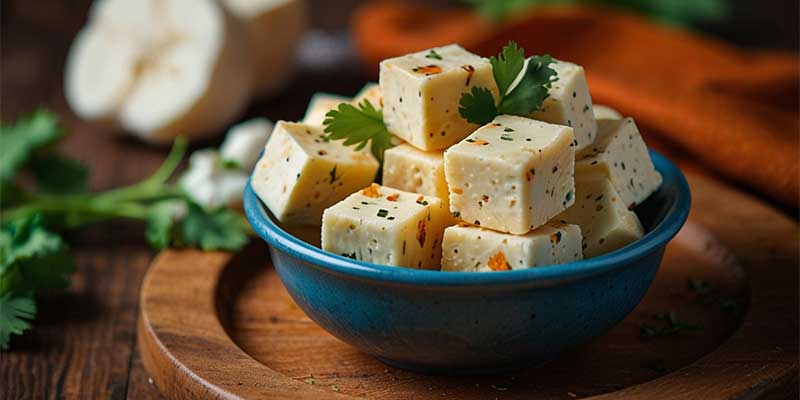Paneer Protein Per 100g
When it comes to vegetarian sources of protein, paneer stands out as a beloved choice in many households. Often featured in a variety of Indian dishes, this soft and crumbly cheese is not just a culinary delight but also a nutritional powerhouse.
If you’re conscious about your protein intake or just curious about the nutritional benefits of paneer, understanding how much protein it provides per 100 grams is essential.
In this blog post, we'll delve into the details of paneer protein content, its health benefits, and why it deserves a prominent place in your diet.
What is Paneer?
Paneer, also known as Indian cottage cheese, is a fresh cheese common in South Asian cuisine, particularly in Indian, Pakistani, Bangladeshi, and Afghan dishes.
Made by curdling milk using a food acid such as lemon juice or vinegar, paneer is an unaged, non-melting cheese that’s firm enough to cut into cubes and soft enough to absorb the flavors of the spices and sauces it’s cooked with.
Paneer Protein Content Per 100g
100 grams of paneer (cottage cheese) contains approximately 18 grams of protein, making it a rich source of protein for vegetarians. This makes it an excellent protein source, particularly for vegetarians who may struggle to meet their protein needs through plant-based foods alone.
Let’s break down the nutritional content of 100 grams of paneer:
- Calories: 265 kcal
- Protein: 18-20 grams
- Fat: 20-25 grams
- Carbohydrates: 1-2 grams
- Calcium: 200-250 mg
- Phosphorus: 140-160 mg
The exact protein content can vary depending on the fat content of the milk used to make the paneer, with full-fat paneer having slightly more fat and fewer proteins compared to low-fat versions.
4 Health Benefits of Paneer
Beyond its impressive protein content, paneer offers several other health benefits:
Rich in Calcium: Paneer is an excellent source of calcium, which is essential for strong bones and teeth. Regular consumption of paneer can help in maintaining bone density and preventing conditions like osteoporosis.
Aids in Weight Management: The high protein content in paneer can help you feel full for longer, reducing overall calorie intake. Additionally, the fat in paneer provides a steady energy source, which can prevent unhealthy snacking.
Supports Digestive Health: Paneer is low in carbohydrates, particularly simple sugars, making it a good option for those who are managing blood sugar levels or are on a low-carb diet.
Boosts Metabolism: The combination of protein and fat in paneer can help boost your metabolism. Protein takes longer to digest, which requires more energy and, in turn, burns more calories.
How to Incorporate Paneer into Your Diet
Paneer is incredibly versatile and can be incorporated into your diet in various ways:
Curries: The most popular way to consume paneer is in curries, such as paneer butter masala, palak paneer, or matar paneer. These dishes are rich, flavorful, and packed with nutrients.
Grilled or Fried: Paneer can be grilled or pan-fried and used as a filling for sandwiches, wraps, or salads. This method preserves its protein content while adding a delicious smoky flavor.
In Salads: Add cubes of raw or grilled paneer to salads for a protein boost. It pairs well with fresh vegetables and a tangy dressing.
Paneer Tikka: Marinate paneer cubes in yogurt and spices, then grill them to make paneer tikka, a popular appetizer that is both tasty and nutritious.
As a Snack: Simply season raw paneer with some salt and pepper, and enjoy it as a quick, high-protein snack.
Conclusion
Paneer is more than just a delicious ingredient in your favorite dishes—it's a potent source of protein that offers a myriad of health benefits.
Whether you’re aiming to build muscle, manage weight, or simply enjoy a nutritious meal, incorporating paneer into your diet is a delicious and healthy choice.
So next time you plan your meals, consider adding more paneer to the menu—not just for its taste, but for the powerful nutritional punch it delivers.


